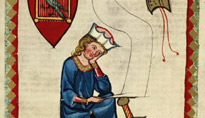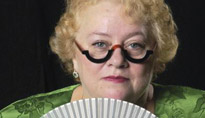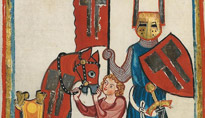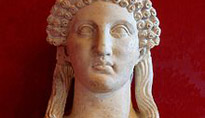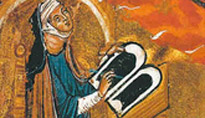jorge a. bosso
musician, composer, cellist
works_vocal_
Der Frühling der Minnesänger ( Bach/ Bosso)
for violin and mixed choir
First performance: June 5th 2009, Philharmonic Hall, Petrozavodsk, Republic of Karelia, Russia
Dora Schwarzberg, violin
Conservatory Choir of Petrozavodsk
Evgeny Gureev, choirmaster
Alexander Skulsky, conductor
Duration: 40’
Allemande
Unter den Linden Parte I
Courante
Unter den Linden Parte II
Sarabande
Unter den Linden Parte III
Gigue
Unter den Linden Parte IIII
Utqueant Laxis
Ciaccona
Dmitri Shostakowitsch wrote a letter to all the composers of the world: “…By building bridges into the future we must take care not to burn the bridges connecting today’s culture to its immortal past…”
Every artistic creation is in close relation with its time and carries in itself a heritage that goes beyond its own nature. And every true artist is situated in an intersectional point between an acquired heritage, his present and a tomorrow that he elaborates himself through a unique and personal path.
Few years ago I wrote Bridges, a composition for female choir and an ensemble of 17 musicians. The work is based on the Preludes and Fugues op. 87 conceived by the Russian author on 1950. The premiere was held in Petrozavodsk and later at the Sakharov Festival in Nizhny Novgorod, Russia, on the 3rd of June 2006. I orchestrated four preludes and fugues (DSCH) and conceived a work of ample gesture which included a Prologue, chorals, an intermezzo with the words of Shostakowitsch himself and an Epilogue that included all the themes of the cycle that I did not orchestrate. The lyrics I used are from Gavril Romanovich Derzhavin (1743-1816), Mikhail Vasilievic Lomonosov (1711-1716), Vladimir Sergeyevich Solovyov (1853-1900), Ivan Andreevic Krylov (1768-1844), Ana Akhmatova, Alexander Blok, Alexander Pushkin.
The entire composition represents for me a symbol. I wanted to put forward the concept of the heritage, the legacy that should never be forgotten, that it is part of the cultural patrimony of every nation, in the search for a superior level of existence from the individual nature towards the collective one; that is in itself the utmost aim of art.
Der Frühling der Minnesänger, is a composition in which I added a vocal part to the Partita II for solo violin in D minor by Johann S. Bach.
The first question that should spring to the mind of every listener with a previous knowledge of Bach’s work is : Why to take music already written and performed ; and more than that: What could be added to a work that has already acquired a position of privilege, an icon in our musical History and the mainstay in the repertoire of every solo violinist?
Once again, through a musical composition, I tried to achieve a significance that goes beyond the work itself. Nietzsche wrote in 1874 “ that the great moments…of the individuals will build a mountain range of the human kind…this is the thought of a faith in the humanity that expresses itself through the urgency of a monumental history...the monogram of their existence, one work, one action, a rare illumination, just one creation: it will live, because no posterity will be able to live without it”. ... the urgency of a monumental history, he wrote ...The word monumentcomes from Latin verb monĕre that means to evoke, to remember, to celebrate. This is the meaning and the etymology of monument.
A monument includes always a tie.
A monument carries in itself a commitment.
A monument implies a responsibility with the past of a society and at the same time an obligation towards the future.
Every time I decide to work on a new composition it takes me quite a long time until I begin to translate into sounds an experience through which I went through. And it is not even about rendering in music a poem, a story or a canvas. The consequence should be the result of an assimilation, an absorption and finally a proposal of a point of view, an statement.
One’s proclamation.
The artist gives his testimony of the truth, of his Truth of the world. The artist must be sure that he and his creation give answers to the wish of Truth.
“ Der Frühling der Minnesänger ” , was ist Minne?
Walter von der Vogelweide expressed:
“ Die Minn ist weder Mann noch Weib,
Sie hat nicht Seele, hat nicht Leib,…”
“ Love is neither man nor woman,
It has neither soul nor body,…”
“ Ihr folge ich als Führerin.”
“ I choose you as my leading ideal.”
( Sarabande)
This is the best definition I could find to understand what the Minnesang was. The tradition of lyric and song writing in Germany that flourished in the 12th century and continued into the 14th century. I quote, above, the words from the most popular poet of the Minnesang tradition to comprehend what this literary movement was, because nothing can speak better about a subject than the subject itself. Although most of the times there is the pretension to make us believe the opposite: a very usual turnover of the values in which the introduction, critical editions, bibliography are used as an smoke curtain to hide, to eclipse, to cover what the text itself has to say.
They wrote love poetry, in the courtly love tradition in Middle High German, during the High Middle Ages. The concept of Love in its utmost expression. The Minnedienst. The service of Love. The aim of the Minne was the elevation of the spirit, and the representation of this spiritual act was the image of the frouwe, the lady. It was a symbol, an emblem, an icon. The representation on the earth of this metaphysical tendency of the human being towards the time without end.
The first strophe of the lyrics, by Walter von der Vogelweide, I proposed for the Allemande:
“Lady, be godly! Hear the plea I make.
I bring a message in my song:
A knight is burdened with a great heart-ache
Under which he's suffered long.
I am to inform you that
If you will turn his mood about,
Without a doubt,
Many hearts will then be glad.”
(Allemande)
The four dances have been written in an strict baroque counterpoint with lyrics of the minnesänger and the epic poem Der Nibelüngen. Four small intermezzi, with the text of the Unter den Linden by Vogelweide have been added in an style that it is nearer to the School of Notre Dame, Leoninus and Perotinus, and the Symphonies of Hildegard von Bingen, it means the XI-XII centuries.
“Under the lime tree
On the heather,
Where we had shared a place of rest,
Still you may find there,
Lovely together,
Flowers crushed and grass down-pressed.
Beside the forest in the vale,
Tándaradéi,
Sweetly sang the nightingale.”
“If any knew
He lay with me
(May God forbid!), for shame I'd die.
What did he do?
May none but he
Ever be sure of that — and I,
And one extremely tiny bird,
Tándaradéi,
Who will, I think, not say a word.”
Unter den Linden, Walther von der Vogelweide, and a nightingale that shared the lovers secrets. We are at the conclusion of the XII century and I feel the flavor of a vision nearer to the paganism still, close to the times in which the voices of the animals communicated the divine will. Until, of course, the Christians did invade the space of ancient cultures.
“ tandaradei,
schône sanc diu nahtegal. “
The Ciaconna was treated in a different and more abstract way, as regards the musical aspect itself. The lyrics belong to Paolo Diacono (the hymn Utqueant Laxis), Giordano Bruno (De Magia Mathematica), Hildegard von Bingen and the Genesis.
I wrote about Minne, and about the meaning of Love in the tradition of the minnesänger.
During the ancient Greek times, a poetess from Lesbos sung:
“A troop of horse, the serried ranks of marchers,
A noble fleet, some think these of all on earth
Most beautiful. For me not anything else regarding
Is my beloved”.
(Sappho)
The concept of Love beside the image of Beauty.
This perception was called Kalokagathìa during the Greek ancient times. Hesiodus, another Greek poet that lived before Sappho, wrote that during the wedding of Kadmos and Harmonia the Muses have sung:
“ Who is beautiful is dear,
who is not beautiful is not dear.”
The Beauty had not a status at least until the age of Pericles, it was always associated to other qualities.
I suggested, before, that the artist gives his testimony of the truth, of his truth of the world. The artist must be sure that he and his creation give answers to the wish of truth. “I refused the concept of experiment, of research in the field of art ”, affirmed Tarkovsky, “any research in art, everything that is called avant-garde, it is pretentious I would dare to say”. Nobody knows what the beauty is. The idea people could have about beauty, the concept of beauty itself change through the history together with philosophical arguments on that matter and just together with the simple development of the man throughout his personal life. And this makes me think that in fact the beauty is the symbol of something different. But what exactly? Beauty as symbol of truth. But not in the sense of the opposition truth- lie, but in the sense of a path of truth that the man chooses. The truth revealed through the beauty it is enigmatic; it cannot be explained with words, but when a human being stares at it, the beauty is perceived, it reveals at once its presence. The beauty is like a miracle and the man its witness. That is all. I think the man was created to live, and to do it through a path towards the truth. That is the reason for what the man creates. The man, somehow creates in a path towards the truth. This is his way of existing and the question about the creation could not really have an answer.
The noun Music has its origins from the name of the Muses, masai in Hellenic language, the act of researching, for the ancients considered necessary their help at the moment of looking for the expressive strength to give to their verses. Once again the origin of the word itself brings us to a superior world.
The great epic poems in Greece were recited as poetry. Also the oracles spoke in verses. The responses from Delphos were recited in verses too. In the I century A.C. the oracle from Delphos spoke in verses and prose, and the responses that were given in prose were later converted in verses by poets at the service of the temple, as we know through the writings of Strabo. Two centuries later Tacit, visited the oracle of Apollo and describes how the pitons in trance listened the requests of the people, then “ drinks a sob of water from a mysterious fountain and proclaims responses in verses”.
Poetry was then connected with the divine knowledge.
Among the ancient Arab cultures the word for poet was sha’ir, “ the one who knows”, or a person that has received the knowledge from the spirits; the poet and the divine medium had been associated by a long tradition in the ancient world.
The attraction towards the divinity and the need of embracing the supreme entity by the ancients poets was a constant at the moment of asking for help to achieve their commitments.
The Hebrew word for heritage nahalà comes from nahàl, meaning river. I find this etymology particularly beautiful because it gives a clear idea of a flow, an evolution, a slow but continuous transformation through time. Fathers and sons swim in the same flow. Of course, I intend by heritage not merely its material sense, but its belonging to a tradition, which, like a river, nahàl, descends from generation to generation. As a symbol of water, since ancient times the river has been a symbol of metamorphosis, the representation of life itself.
I have always felt attracted by the etymology. Because every word has an inherent antiquity, an own past, and the pretension of a present consciousness of their path through the centuries, casts us towards the future with the cognition of an archaic contemporaneity. Etymon means, in Greek, what is certain, because the Greeks conceived that what it is sure about a word is its origin, that primary instant in which it happens.
Abstract words are to the speech like ancient coins whose engraved images have been deteriorated through the process of continuous use and exchange.
Bach represents a point of arrival, after following a long path which began with the school of the polyphony of Notre Dame. But at the same time is the foundation of a new era. Bach represents an infinite source that speaks nowadays towards eternity.
“ One generation come and another one goes and the earth forever remains still ” we read in the first chapter from the Ecclesiastes.
We come back, once more to this cyclic concept that appears almost constantly. The image of culture and tradition represented by flow, evolution, by a slow but continuous metamorphosis in time. Today we are here, but tomorrow no longer ; nevertheless our ideas and our thoughts remain and they remain and exist for thousand and ten thousand years, as Galileo wrote, creating a channel of communication from today towards time without end.
Art, as an expression of this infinite research, should be part of our daily life.
I do not believe in art as an absolute value. Should we perceive as a work of art any aesthetic manifestation that does not have the possibility to establish a link between itself and the world in which it lives?
Aesthetic, as a word, appeared in 1735 in Philosophical Meditations on Arguments Concerning Poetry written by Alexander Gottlieb Baumgartner. He formulated the expression “aesthetica” as coming from the Greek root aisth and aisthanomai, which means “to relate to something through the senses”.
Music as an element of communion with others.
Each work of art has a reason to exist from the moment in which it establishes a fundamental bipolarity: from one side, the urgency, the fatal destiny of its arrival into our world, and from the other side its reception into the world and the need of a response to it.
The audience should be always be considered as a part of a process of active listening. And to achieve this result I feel necessary the sense of originality.
Originality, intended in its deepest meaning, originality as daughter of an inner need. Its etymology in Latin : orīri , to rise.
Originality as a result from a need of communication.
Originality, not in the sense of presenting an artistic project to the community, but as an urgent rendering, commūnis, an artistic manifestation.
As regards the lyrics for the Ciaccona, I proposed the hymn of Paolo Diacono, Utqueant laxis, the verses from which Guido D’ Arezzo conceived the name of our musical notes. I overlapped the whole hexachord and in this way I worked out the whole movement.
“Ut queant laxis
Resonare fibris
Mira gestorum
Famuli tuorum
Solve polluti
Labii reatum,
Sancte Iohannes”
“ So that your servants
could sing with free voices
the marvels of your actions,
cancel the sin,
O Saint John,
from their corrupted lips”
(Ciaccona)
I decided to use it, because it is our primary matter. As for the language it is the letter, for our way of expression, our clay, our mud it is the sound.
Monuments built to construct a collective memory made of indelible bricks that ties us to a common History, that monumental History Nietzsche spoke about. And these bricks, these letters had been created and introduced to support the memory of things to avoid the possibility they could vanish into the oblivion.
As nearer as we consider a word, the more far away it looks. And the more we penetrate into the universe of a word, the more it offers us its own life through the centuries, because the word has its own existence and our lives happen through it. The same I feel with the sounds.
The sound was created before the word, before the possibility of communicating through the word among the human beings. The birds appeared before Adam and Eva.
“ And God said: …that the birds can fly over the earth and throughout the skies.” (Genesis, I, 20)
The arrogance of the man in his aim of climbing towards the divinity was punished through the spoken language. The Babel tower was condemned by God because the human kind tried to rebuild, against his will, that axis between heaven and earth, broken by the original sin. God, not to let accomplish their purpose, gave birth to the different languages. And on the other hand, He did not take away from the man the possibility of communicating through the music.
Because the intrinsic nature of the music, its essence in itself does not belong to us.
Another thoughts I included in the Ciaccona come from De Magia Mathematica by Giordano Bruno and the poetry by Hildegard von Bingen.
From the very beginning I decided to use them, because of their clarity of logos, lucidity of the concept of God and his operationes divinae. The idea of the ultimate beginning.
The man becomes idealist when proper circumstances allow his imagination to conceive probable developments, and on the other hand when the faculty of thinking reaches such an improvement that the mind can anticipate the experience.
The man is a symbolic animal, and he should not become bigger that his ideas, as Music should be always part of something wider than ourselves. I am persuaded that if we could embrace just part of its flavor and essence, it could be a huge step forward towards a research for a superior level of existence.
Lyrics
Allemande |
(English translation) |
|
"Frouwe, vernemt dur Got von mir diz mære: Walther von der Vogelweide |
Lady, be godly! Hear the plea I make. |
|
Unter den Linden Part I Unter der linden |
(English translation) Under the lime tree |
|
Courante Das Nibelungelied (1190-1200) IV Aventivre wie sivrit mit den sahsen streit |
(English translation)
|
|
si fvorten doch niht mere | niwan tvsent man do waren ovch di sahsen | mit ir scharn chomn der herrn scarmeister | daz volch do fvorte dan sindolt vnd hvnolt | vnt ovch gernot die von tenemarche | versvochten wol ir hant si chomn degenliche | mit samt sivride dar. |
More than a thousand warriors / they there had not a man, The leaders forth to battle / led the warriors then. Sindold and Hunold / and Gernot as well, The knights of Denmark tested / how they could weapons wield. (translation, George Henry Needler) |
|
Unter den Linden Part II |
(English translation) |
|
Ich kam gegangen |
I came to meet him |
|
Sarabande |
||
Die Minn ist weder Mann noch Weib, Walther von der Vogelweide |
||
Unter den Linden Part III |
(English translation) |
|
Dô hete er gemachet |
There he had fashioned |
|
Gigue |
(English translation) |
|
Ez ist nu tac Daz guote wîp |
“It is day now! That good woman |
|
Unter den Linden Part IIII |
(English translation) |
|
Daz er bî mir læge, |
If any knew translation copyright © 1970, 1981, 2001 by Raymond Oliver |
|
Utqueant Laxis |
(English translation) |
|
Ut queant laxis |
So that your servants may, |
|
Ciaccona |
(English translation) |
|
Influit Deus in angelos, |
God provides his influence to the angels, |
|
Genesis (1/27-31) |
(English translation) |
|
Et creavit Deus hominem ad imaginem suam; ad imaginem Dei creavit illum; masculum et feminam creavit eos. Dixitque Deus: “Ecce dedi vobis omnem herbam afferentem semen super terram et universa ligna, quae habent in semetipsis fructum ligni portantem sementem … Viditque Deus cuncta, quae fecit, et ecce erant valde bona. Et factum est vespere et mane, dies sextus. |
So God created man in his own image, in the image of God he created him; male and female he created them. And God said: “ Behold, I have given you every plant yielding seed which is upon the face of all the earth, and every tree with seed in its fruit … And God saw everything what he had made, and behold, it was very good. And there was evening and there was morning, a sixth day. |
|
Das Annolied |
(English translation) The Song of Anno |
|
WIr horten ie dikke singen In der werilde aneginne, |
Often have we listened to tales In the beginning of the world, (The Song of Anno" was composed in 1100 ca. by a monk of the Siegburg Abbey) |
|
Hildegard von Bingen (1098- 1179) |
(English translation) |
|
O rubor sanguinis, |
O ruby blood |
|



